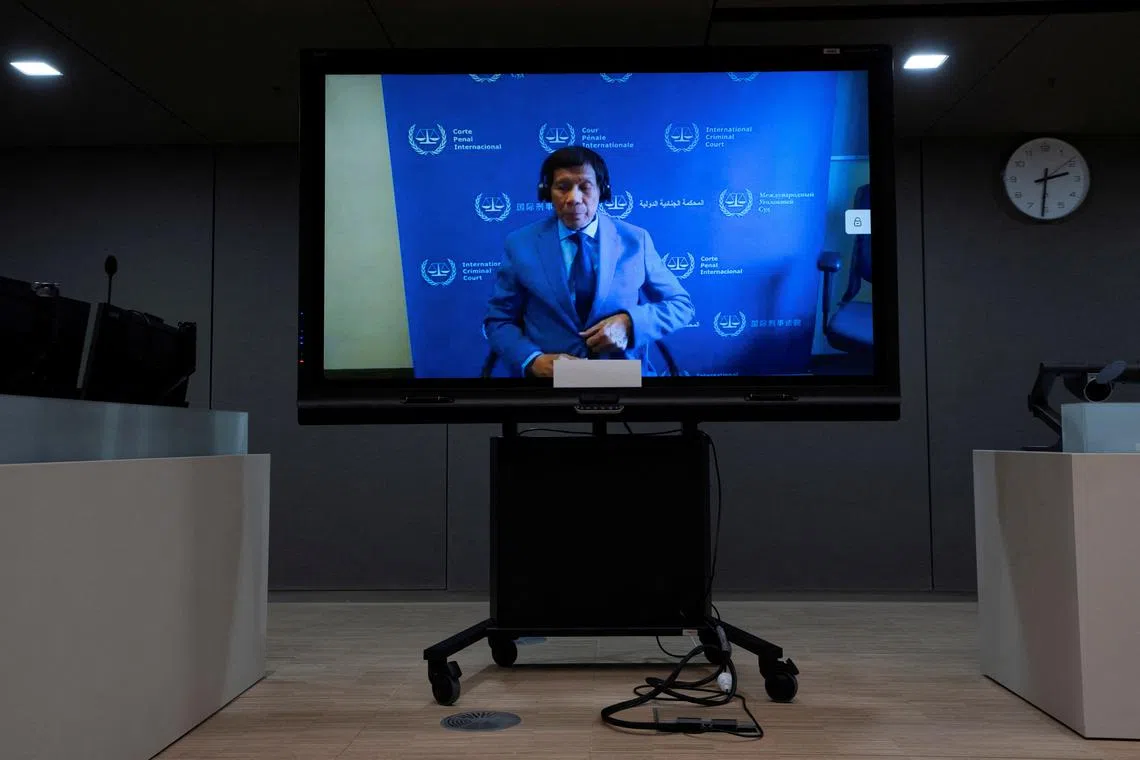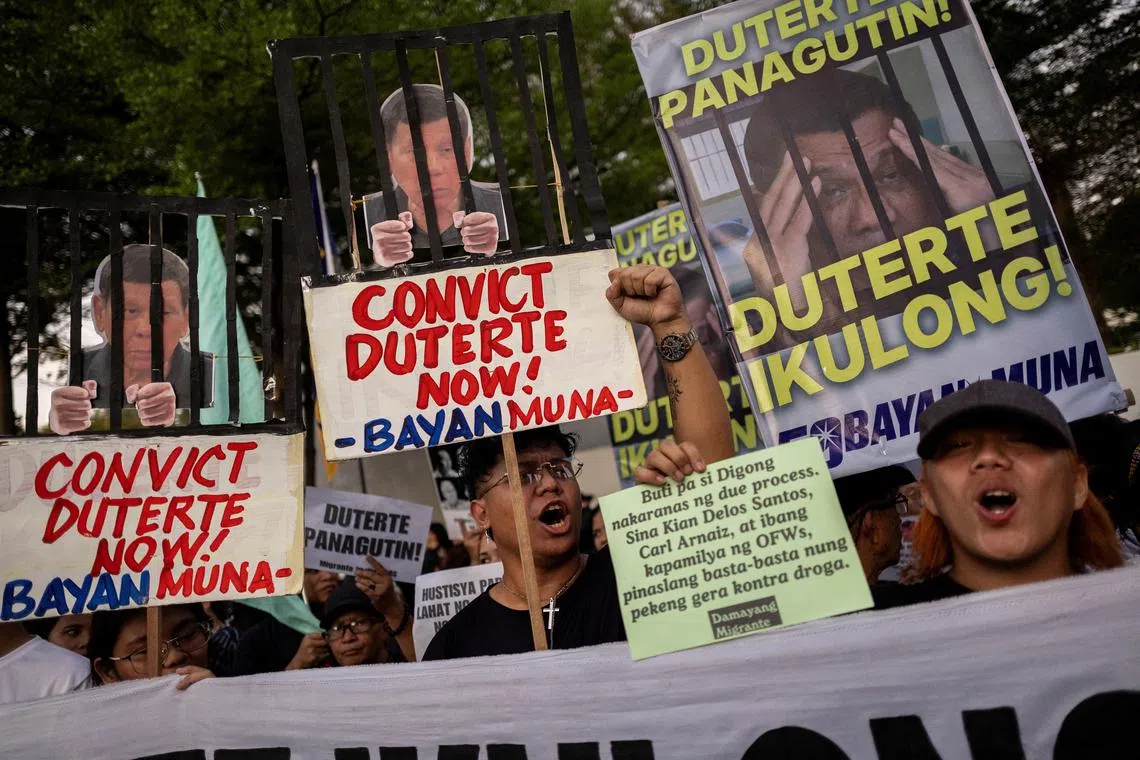After Duterte’s arrest, Philippine drug war victims face abuse and online falsehoods
Sign up now: Get insights on Asia's fast-moving developments

Former president Rodrigo Duterte is facing “crimes against humanity” allegations before the International Criminal Court.
PHOTO: REUTERS
MANILA – The bloodied body of Ms Sheerah Escudero’s 18-year-old brother was found in 2017 with hands bound and head wrapped in packaging tape, a suspected victim of the Philippines’ then President Rodrigo Duterte’s “war on drugs” that left thousands dead.
The arrest of Mr Duterte on March 11
Ms Escudero’s Facebook account has been flooded with comments and direct messages calling her a drug addict and a liar for seeking justice in her brother’s case, and accusing her of being paid to malign Mr Duterte.
“They’re really cursing us, and one person even told me ‘addicts should be beheaded. They should just die’. Knowing that my brother was the victim, they still sent me that message,” she said.
Other grieving mothers
A surge of false claims also swept social media, with supporters claiming the ICC has no jurisdiction and calling it a “kidnapping”, while paid advertisements on Facebook promoted the former president, Reuters found.
Reuters spoke to three human rights groups that each said they have assisted several victims of targeted online harassment.
Representatives for Ms Duterte and his daughter, Philippine Vice-President Sara Duterte, who has flown to The Hague to support her father, did not respond to requests for comment.
The recent online onslaught is reminiscent of a well-organised social media campaign in 2016 that propelled Mr Duterte into the presidency, analysts say. Critics at the time blamed pro-Duterte trolls and influencers for spreading falsehoods to discredit and threaten opponents.
The 2016 campaign led to the Philippines being dubbed “patient zero” in the worldwide spread of online disinformation.
Ms Kristina Conti, a human rights lawyer representing victims of the drug war, said such tactics increasingly aim to discredit families of those killed by labelling them as “fake” victims.
“There’s that real risk that Duterte supporters or Duterte’s cohorts could go after these witnesses in hopes of hindering trial or ensuring his acquittal,” Ms Conti said.
Fake quotes, fictional lawyers
Mr Duterte, who led the Philippines from 2016 to 2022, is facing allegations of crimes against humanity for overseeing death squads in his anti-drugs crackdown. He could become the first Asian former head of state to go on trial in The Hague.
A study by the Stratbase ADR Institute, a Philippine think-tank, found that around 51 per cent of Filipinos strongly agreed that Mr Duterte should be held accountable for the killings.
But others have criticised the arrest and accused the government led by President Ferdinand Marcos Jr of betraying the country.
The backlash has been fuelled by a “torrent of disinformation across social media”, according to fact-checking coalition Tsek.ph, which described fabricated quote cards and videos and narratives that attempted to cast Mr Duterte as a victim.
The group identified at least 200 Facebook accounts and pages that posted identical messages, in close succession, before and after the arrest, claiming any legal move against him amounted to “kidnapping”. Mr Duterte’s children, and lawyer used the phrase to denounce the arrest.
Quote cards were circulated featuring fictional lawyers such as Elle Woods from the film Legally Blonde supposedly defending Mr Duterte, and viral video clips falsely suggested Duterte supporters were gathering to protest.
Other posts wrongly said US President Donald Trump has threatened heavy tariffs on the Philippines unless Mr Duterte is released.
“Media literacy is still lacking, so many people are easily deceived,” said Professor Rachel Khan, who teaches journalism at the University of the Philippines and project coordinator for Tsek.ph.
Hundreds of paid advertisements supporting Mr Duterte on Facebook have reached audiences of millions, according to the social media platform’s ad library.
The ads included videos saying Mr Duterte was “kidnapped”, promotions for prayer rallies, and the sale of T-shirts bearing his image with the phrase “I did it for my country”.
Many ran without the disclaimer required for political advertising, according to the ad library.

Demonstrators demanding conviction and imprisonment for former president Rodrigo Duterte.
PHOTO: REUTERS
Paid ads are reviewed by Meta’s “ad review system” before they go live but “both machines and human reviewers make mistakes”.
A spokesman for the company said the tech conglomerate takes “significant steps to fight the spread of misinformation” by removing content that violates its standards, curbing the distribution of stories that are flagged as false by independent fact-checkers, and labelling content so users are informed about its accuracy.
A spokesperson for TikTok said the platform did not allow “harmful misinformation” and has “taken down content that violates our Community Guidelines.”
Let truth speak
The Philippine government is “making necessary actions to eradicate fake news”, including holding discussions with social media platforms like Facebook, Presidential Communications Undersecretary Claire Castro told Reuters.
Some human rights activists are trying to fight back on their own.
Mr Carlos Conde, a senior researcher at Human Rights Watch, who was targeted by Duterte supporters during the drug war and came under fresh attack after the arrest, said it was “like 2016 all over again”.
The 59-year-old created a TikTok account where he posts short explainer videos about the arrest and the drug war, garnering tens of thousands of views.
“I did that so I will not lose by default in this disinformation warfare,” he said.
Ms Escudero said she fears the online abuse could lead to violence against her and avoids booking taxis under her real name, but insisted she would not back down from seeking justice.
“This is the time to stand up against fake news... We will let the truth speak and be seen.” REUTERS


